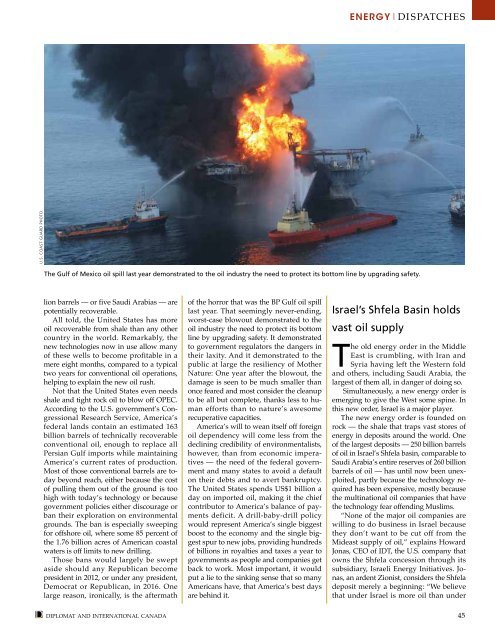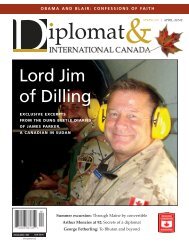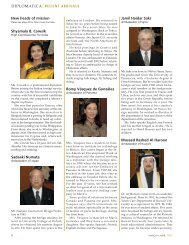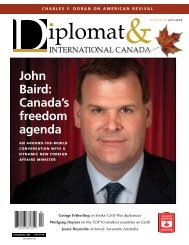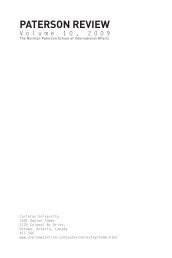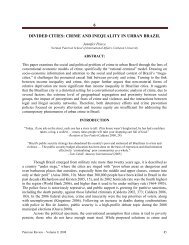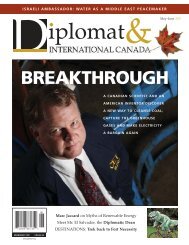the new petro power paradigm - Diplomat Magazine
the new petro power paradigm - Diplomat Magazine
the new petro power paradigm - Diplomat Magazine
Create successful ePaper yourself
Turn your PDF publications into a flip-book with our unique Google optimized e-Paper software.
ENERGY|Di spatches<br />
U.S. Coast Guard photo<br />
The Gulf of Mexico oil spill last year demonstrated to <strong>the</strong> oil industry <strong>the</strong> need to protect its bottom line by upgrading safety.<br />
lion barrels — or five Saudi Arabias — are<br />
potentially recoverable.<br />
All told, <strong>the</strong> United States has more<br />
oil recoverable from shale than any o<strong>the</strong>r<br />
country in <strong>the</strong> world. Remarkably, <strong>the</strong><br />
<strong>new</strong> technologies now in use allow many<br />
of <strong>the</strong>se wells to become profitable in a<br />
mere eight months, compared to a typical<br />
two years for conventional oil operations,<br />
helping to explain <strong>the</strong> <strong>new</strong> oil rush.<br />
Not that <strong>the</strong> United States even needs<br />
shale and tight rock oil to blow off OPEC.<br />
According to <strong>the</strong> U.S. government’s Congressional<br />
Research Service, America’s<br />
federal lands contain an estimated 163<br />
billion barrels of technically recoverable<br />
conventional oil, enough to replace all<br />
Persian Gulf imports while maintaining<br />
America’s current rates of production.<br />
Most of those conventional barrels are today<br />
beyond reach, ei<strong>the</strong>r because <strong>the</strong> cost<br />
of pulling <strong>the</strong>m out of <strong>the</strong> ground is too<br />
high with today’s technology or because<br />
government policies ei<strong>the</strong>r discourage or<br />
ban <strong>the</strong>ir exploration on environmental<br />
grounds. The ban is especially sweeping<br />
for offshore oil, where some 85 percent of<br />
<strong>the</strong> 1.76 billion acres of American coastal<br />
waters is off limits to <strong>new</strong> drilling.<br />
Those bans would largely be swept<br />
aside should any Republican become<br />
president in 2012, or under any president,<br />
Democrat or Republican, in 2016. One<br />
large reason, ironically, is <strong>the</strong> aftermath<br />
diplomat and international canada<br />
of <strong>the</strong> horror that was <strong>the</strong> BP Gulf oil spill<br />
last year. That seemingly never-ending,<br />
worst-case blowout demonstrated to <strong>the</strong><br />
oil industry <strong>the</strong> need to protect its bottom<br />
line by upgrading safety. It demonstrated<br />
to government regulators <strong>the</strong> dangers in<br />
<strong>the</strong>ir laxity. And it demonstrated to <strong>the</strong><br />
public at large <strong>the</strong> resiliency of Mo<strong>the</strong>r<br />
Nature: One year after <strong>the</strong> blowout, <strong>the</strong><br />
damage is seen to be much smaller than<br />
once feared and most consider <strong>the</strong> cleanup<br />
to be all but complete, thanks less to human<br />
efforts than to nature’s awesome<br />
recuperative capacities.<br />
America’s will to wean itself off foreign<br />
oil dependency will come less from <strong>the</strong><br />
declining credibility of environmentalists,<br />
however, than from economic imperatives<br />
— <strong>the</strong> need of <strong>the</strong> federal government<br />
and many states to avoid a default<br />
on <strong>the</strong>ir debts and to avert bankruptcy.<br />
The United States spends US$1 billion a<br />
day on imported oil, making it <strong>the</strong> chief<br />
contributor to America’s balance of payments<br />
deficit. A drill-baby-drill policy<br />
would represent America’s single biggest<br />
boost to <strong>the</strong> economy and <strong>the</strong> single biggest<br />
spur to <strong>new</strong> jobs, providing hundreds<br />
of billions in royalties and taxes a year to<br />
governments as people and companies get<br />
back to work. Most important, it would<br />
put a lie to <strong>the</strong> sinking sense that so many<br />
Americans have, that America’s best days<br />
are behind it.<br />
Israel’s Shfela Basin holds<br />
vast oil supply<br />
The old energy order in <strong>the</strong> Middle<br />
East is crumbling, with Iran and<br />
Syria having left <strong>the</strong> Western fold<br />
and o<strong>the</strong>rs, including Saudi Arabia, <strong>the</strong><br />
largest of <strong>the</strong>m all, in danger of doing so.<br />
Simultaneously, a <strong>new</strong> energy order is<br />
emerging to give <strong>the</strong> West some spine. In<br />
this <strong>new</strong> order, Israel is a major player.<br />
The <strong>new</strong> energy order is founded on<br />
rock — <strong>the</strong> shale that traps vast stores of<br />
energy in deposits around <strong>the</strong> world. One<br />
of <strong>the</strong> largest deposits — 250 billion barrels<br />
of oil in Israel’s Shfela basin, comparable to<br />
Saudi Arabia’s entire reserves of 260 billion<br />
barrels of oil — has until now been unexploited,<br />
partly because <strong>the</strong> technology required<br />
has been expensive, mostly because<br />
<strong>the</strong> multinational oil companies that have<br />
<strong>the</strong> technology fear offending Muslims.<br />
“None of <strong>the</strong> major oil companies are<br />
willing to do business in Israel because<br />
<strong>the</strong>y don’t want to be cut off from <strong>the</strong><br />
Mideast supply of oil,” explains Howard<br />
Jonas, CEO of IDT, <strong>the</strong> U.S. company that<br />
owns <strong>the</strong> Shfela concession through its<br />
subsidiary, Israeli Energy Initiatives. Jonas,<br />
an ardent Zionist, considers <strong>the</strong> Shfela<br />
deposit merely a beginning: “We believe<br />
that under Israel is more oil than under<br />
45


